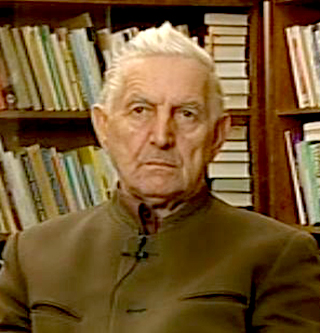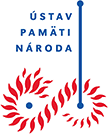Jozef Krajňák (1929 - 2015)

Biography:
“If I want to defend the truth, there are things I have to give up.”
Jozef Krajňák was born on February 19, 1929 in a peasant family in a little mountain village called Abrahámovce. Later, when he was four years old, his family moved to Veľká Lomnica. There were only five Slovak families in this village back then, whilst other inhabitants were German. In 1935 there was the first Slovak school opened in this village and Jozef became one of its pupils. When he was twelve, his mother died and from then on he was brought up by his grandparents. Since his early childhood he sensitively perceived work of the parish priests. Being enthusiastic about their personalities and faith, he decided to become one of them. Although in 1948 he entered a seminary in Bruntál in Bohemia, two years later this seminary was closed and Jozef had to return home. In 1951 he received a call-up to an Auxiliary Technical Battalion (PTP) in Mimoň. Being marked as a politically unreliable person, he happened to be an unarmed soldier. Despite frequent political trainings and hard work claimless of any holiday, he repeatedly managed to refuse working on Sundays. This didn´t stay without response, though, and as a punishment he had to stay in PTP for some months longer. After he came back home in 1954, he began working for the Czechoslovak Building Construction Company in Poprad. At that time, a legalization of abortions was being prepared. Jozef had the courage to rewrite leaflets against abortions after his work shift and he distributed them among workers̓ wives. His “friend” informed the State Security about that, however, and subsequently Jozef was investigated and tried. The judge took into consideration the fact that this was his first criminal offence and therefore he was sentenced only to four-month imprisonment, with two-year suspended sentence. In 1960 he married Mária Zacherová. When there were four little children in the family, communist regime harshly stroke their lives again. On August 7, 1965 Jozef Krajňák attended the funeral of a Spiš Diocese Bishop Ján Vojtaššák. He knew this bishop in person, he respected him, and so he felt a moral duty to deliver a speech over his grave. In his courageous speech he openly expressed criticism towards the regime. Publicly he called the regime the one that persecutes the truth and promotes lies, destroys the best sons of nation, drags them from prison to prison, tortures them, until after many years there are only lifeless bodies left to live on. In a short time period, Jozef was for this act detained by the State Security and placed into a remand centre in Banská Bystrica for 70 days. The Regional Court in Dolný Kubín sentenced him to two-year imprisonment for rebellion against the Republic. Based on societal guarantee of his former colleagues, after six months of serving his sentence, he was released from the prison. When he returned home, he continued working as a storeman at the Building Construction Company in Poprad. Jozef Krajňák died on March 18, 2015.
“Criminal Offense” – Delivering a Speech over the Bishop´s Grave
“It was a horrible era and I used precisely the following words in my speech: “This is era that persecutes the truth and promotes lies; era that destroys the best sons of nation, people whose desire is to work for material and intellectual welfare. It forcibly disrupts them from our ranks. It tortures and drags them from prison to prison until after many years there are only lifeless bodies left to live on.” This was the main part I said. Besides this, I pilloried the regime also in other ways, but these were the words which, as they were said publicly aloud, were considered a criminal offence during their regime. My only luck at that funeral was that the public address system was off. If it was broadcasted to the whole village, I would have been sentenced up to nine years of imprisonment.”
Fear of Revealing the Contacts
“I was really afraid that during the investigation I would have to reveal the names of people from Kežmarok who gave me things that the State Security found during the home inspection. This way I would have caused serious problems to these people. However, Lord God arranged it the way that they asked me nothing about those people. And till now I am thankful to God for this, because it was my greatest concern whether I would be forced to say something bad about someone. Luckily, it never happened. Thanks God.”
Trial in Dolný Kubín
“After seventy days they brought me to the trial in Dolný Kubín. There were two or three State Security members escorting me; they gave me handcuffs because the way through Ružomberok is quite long. We traveled about an hour and a half or so. At the Regional Court in Dolný Kubín several people expected me to come. They probably knew I was about to be tried for this kind of offense, but they didn´t get into the courtroom. A young judge led the trial and his first question was whether I felt guilty or not. I answered: “According to my conscience I feel innocent, however, according to your principles, yes, I do feel guilty.” Well, he didn´t like that. He harshly expressed his opinion and after the trial I was taken back to Banská Bystrica. Few weeks later they transported me to Belušice in Bohemia.”
Remand Centre in Banská Bystrica
“The worst thing was that we weren´t allowed to sit down the whole day. We had to walk. The chair in the wall was skew, so even if one sat on it for a while, he got calluses as he was sliding down. And we could go to bed only at nine o´clock. There was no way to sit on the bed during the day. It was a simple bed, made out of straw mattress. Few minutes before nine in the evening, a train used to arrive from Košice. Therefore we always used to listen to the locomotive air horns representing the time for bed to us, because we were terribly exhausted from the whole-day walking. Our feet were swollen, too.”
Visit in Belušice Prison
“My family, my wife came to visit me once to the Northern Bohemia, to Belušice. She received permission and so she traveled whole night from Hrabušice. Our children stayed with her mom. Though, she was allowed to spend with me only half an hour. We could talk together, but the State Security member had to be present there all the time; we couldn´t talk about anything else, except the family matters. The issue of how we were treated there was a taboo; we could not speak about that.”
Four Little Children Left Behind
“We had four children at the time when I was arrested for delivering the speech over the grave of Bishop Vojtaššák in Zákamenné. My family put up with it with many difficulties, because there was only one more day until I would receive the family allowance. After my arrest, my wife received only twenty crowns and no one from the government was concerned to help, to care about how the family would survive. Thanks God, there were some good people around who helped her overcome this greatest crisis.”
The story and videoclips of this witness were put together and published thanks to the financial support of EU within the programme Europe for Citizens – Active European Remembrance.

